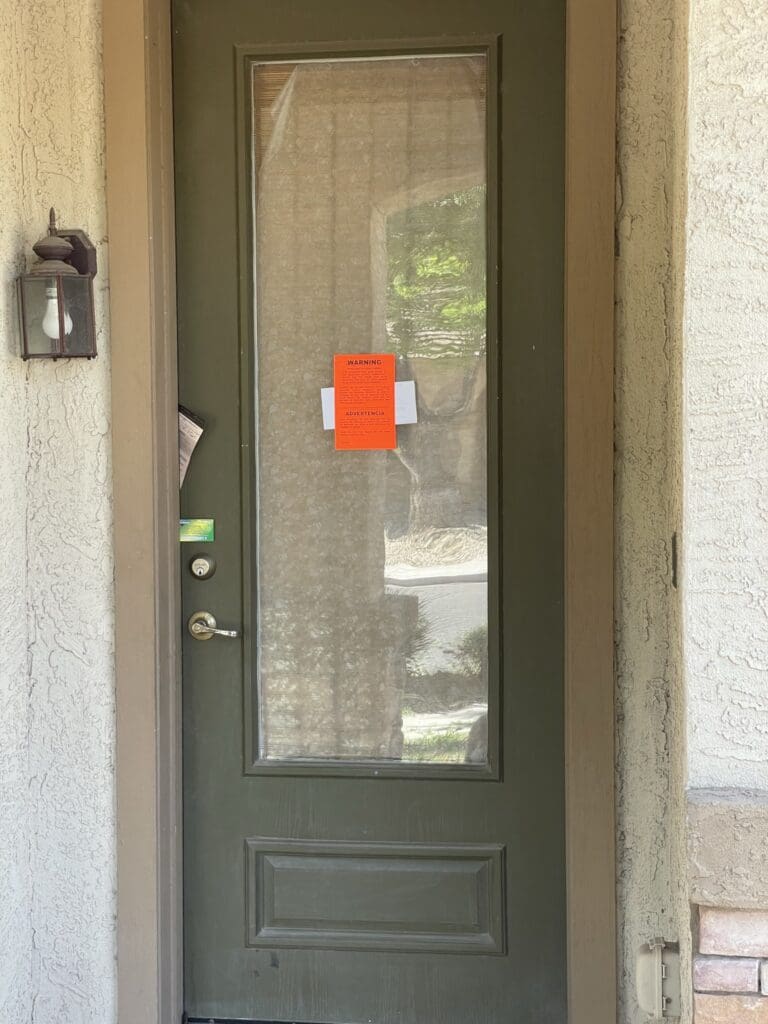Arizona law is clear that eviction cases are designed to address the issue of possession and not the issue of property ownership. The limited scope of a forcible entry and detainer action has been strictly defined by Arizona statute. A.R.S. § 12-1177(A) states in relevant part:
On the trial of an action of Forcible Entry or Forcible Detainer, the only issue shall be the right of actual possession and the merits of title shall not be inquired into.
A.R.S. 12-1177(A)
Evidence offered to the Arizona Superior Court showing anything other than who is entitled to possess the property will be excluded from an eviction hearing. This means that a defendant-tenant who claims ownership of the rental property must file a quiet title action and not raise the issue during an eviction hearing.
Proof of property Ownership
The Arizona Superior Court’s inquiry into property ownership is limited to the extent that Plaintiff holds title to the property in dispute. If the Plaintiff – Arizona Landlord’s name appears on the trustee’s deed then the Court should not inquire into ownership any further.
The issuance of the Trustee’s Deed to Plaintiff is conclusive evidence that all statutory requirements for the Trustee’s Sale were satisfied and that Plaintiff has the right to possession of the Property.
A.R.S. § 33-811(B) further provides:
…the Trustee’s deed shall raise the presumption of compliance with the requirements of this chapter relating to the exercise of the power of sale and the sale of the trust property, including recording, mailing, publishing, and posting of the notice of sale and the conduct of the sale.

eviction cases are summary remedies
Arizona courts have held that litigation as to the validity of title “would convert a forcible detainer action into a quiet title action and defeat its purpose as a summary remedy.” Curtis v. Morris, 186 Ariz. 534, 535, 925 P.2d 259, 260 (1996).
For example, in Merrifield v. Merrifield, 95 Ariz. 152, 154, 388 P.2d 153, 155 (1963), the plaintiff held title to property pursuant to quitclaim deed which was valid on its face. The lower court nonetheless inquired into the merits of that title and refused to find the defendant guilty of forcible entry and detainer. The Arizona Supreme Court reversed the lower court’s ruling because plaintiff was entitled to possession as the title holder and pursuant to A.R.S. § 12-1177, the trial court was prohibited from considering the merits of the plaintiff’s title. Accordingly, any evidence offered by Defendants to raise extrinsic issues or disprove Plaintiff’s title must be excluded.
In another case demonstrating the Superior Courts inability to inquire into ownership in a forcible detainer (see Olds Bros. Lumber Co. v. Rushing, 64 Ariz. 199, 167 P.2d 394 (1946), the Arizona Supreme Court stated: “[T]he statutes of this state make that very plain and indicate quite clearly that the right to actual possession is the only issue to be determined in such an action.” Id. at 204, 397. The court also discussed the legislative intent in limiting the scope of a forcible entry and detainer action stating:
The object of a forcible entry and detainer action is to afford a summary, speedy and adequate remedy for obtaining possession of premises withheld by tenants, and for this reason this objective would be entirely frustrated if the defendant were permitted to deny his landlord’s title, or to interpose customary and usual defenses permissible in the ordinary action at law. And for the same reason, the merits of the title may not be inquired into in such an action, for if the merits of the title and other defenses above enumerated were permitted and the court heard testimony concerning them, then other and secondary issues would be presented to the court and the action would not afford a summary, speedy and adequate remedy for obtaining possession of the premises.
Olds Bros. Lumber Co. v. Rushing, 64 Ariz. 199, 167 P.2d 394 (1946))
Id. at 204-05, 397. Because the trustee’s deed is conclusive evidence of Plaintiff’s title under A.R.S. § 33-811(B), and because the court is prohibited from inquiring into the merits of that title under A.R.S. § 12-1177(A), judgment must be rendered in favor of Plaintiff regardless of any defense of ownership the Defendants may raise.
Ownership Disputes in the Justice Court
The ownership of property and their interaction with evictions can become very complex. The above article discusses issues of ownership disputes and evictions in the Superior Court, however, the rules that apply to ownership disputes and evictions in the Justice Court (where most evictions take place) are completely different.
A.R.S. § 22-201(D) addresses this issue:
Justices of the peace have jurisdiction to try the right to possession of real property when title or ownership is not a subject of inquiry in the action. If in any such action the title or ownership of real property becomes an issue, the justice shall so certify in the court record, at once stop further proceedings in the action and forward all papers together with a certified copy of the court record in the action to the Superior Court, where the action shall be docketed and determined as though originally brought in the Superior Court.
A.R.S. § 22-201(D)
A.R.S. § 22-201(F) adds further clarification:
In actions between landlord and tenant for possession of leased premises, the title to the property leased shall not be raised nor made an issue.
A.R.S. § 22-201(F)
Occasionally, when a case is sent to the Superior Court an Arizona landlord will respond, “but my tenant doesn’t own the property! It’s mine! They’re just lying! Why is the judge believing them? What could have been done to prevent this?”
While a landlords’ frustration is understandable it’s important to remember that the Justice Court judge is just following the law. Just because a Justice Court Judge moves a case into the Arizona Superior Court system does not mean they believe the tenant. Additionally, it does not mean that the tenant did something right or that we made some kind of a mistake. It simply means the Judge is following the law.
For help with your Arizona landlord – tenant matters contact the Dunaway Law Group at 480-389-6529 or message us HERE.
* The information provided is informational only, does not constitute legal advice, and will not create an attorney-client or attorney-prospective client relationship. Additionally, the Dunaway Law Group, PLC limits its practice to the State of Arizona.


